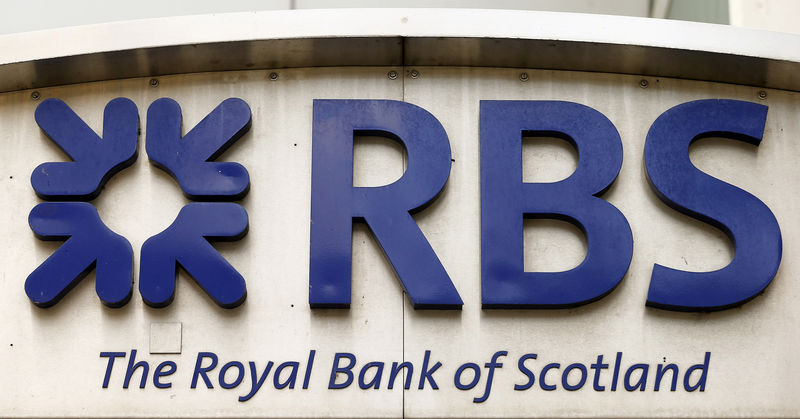By Emma Rumney and Simon Jessop
LONDON (Reuters) - Paying a dividend will broaden interest in Royal Bank of Scotland (L:RBS), but a sudden influx of new shareholders is unlikely given the British government's still dominant stake and as investors wait to ensure it can sustain the payout.
RBS said on Tuesday it will pay an interim dividend of 2 pence per share in October, the first payout by the state-owned bank since it was rescued with a 45.5 billion pound bailout in the financial crisis of 2008.
Although the resumption of payments should enable investors requiring regular dividend income to consider buying into RBS, for the first time in ten years, some still need convincing by the bank which is still 62.4 percent owned by the government.
"You need further evidence it (the dividend) is sustainable," Siddarth Chand Lall of Hargreave Hale's Marlborough Multi-cap Income fund told Reuters.
"Anything with a record where they've cut it in the past, you need to be sure that it is now, indeed, strong enough," he said, adding that he would assess the sustainability of the RBS dividend once it rose to its expected yield of 4.8 percent, or 11.6 pence, next year before looking at the stock.
While its first dividend is relatively small, RBS plans to build this up and is targeting a payout ratio equal to 40 percent of its profit.
Lloyds Banking Group (L:LLOY), which was also bailed out during the financial crisis, offers a dividend yield of 5.1 percent - the second highest among Britain's main banks after HSBC (L:HSBA), which has a dividend yield of 5.4 percent, Thomson Reuters data shows.
"Returning to paying a dividend is a step back towards normality for the company and widens its investor appeal," one of RBS's top-40 shareholders said.
This in turn was expected to support future government share sales by expanding the market of potential investors.
But until the government sells down its stake, the shareholder continued, RBS is stuck with a "very non-standard shareholder register".
SHARE SLUMP
Shares in RBS have fallen by more than 12 percent since the government resumed sales in June, despite the bank preparing to return excess capital it has built up over the years in anticipation of misconduct fines. https://tmsnrt.rs/2PbfFLx
A $4.9 billion settlement with the U.S. Department of Justice, which was signed on Tuesday and prompted the dividend announcement, was the last large financial consequence of past misconduct still facing the bank.
And RBS chief executive Ross McEwan said this month that the bank could look to pay a special dividend or buy back its own shares from next year.
"2019 and beyond look set to be more meaningful for capital returns," Richard Smith, analyst at KBW, told Reuters.
However, a financial recovery at RBS is just part of the investment story for some prospective shareholders who are also looking at how the bank is performing relative to its peers.
"The most successful banks in the long run are the ones that look after depositors," said a portfolio manager at London-based firm Oldfield Partners, who declined to be named, adding he was more interested in other banks with a stronger customer reputation than RBS.
A survey of customer perceptions on Wednesday by Britain's Competition and Markets Authority scored RBS joint lowest, although its NatWest brand fared slightly better.
